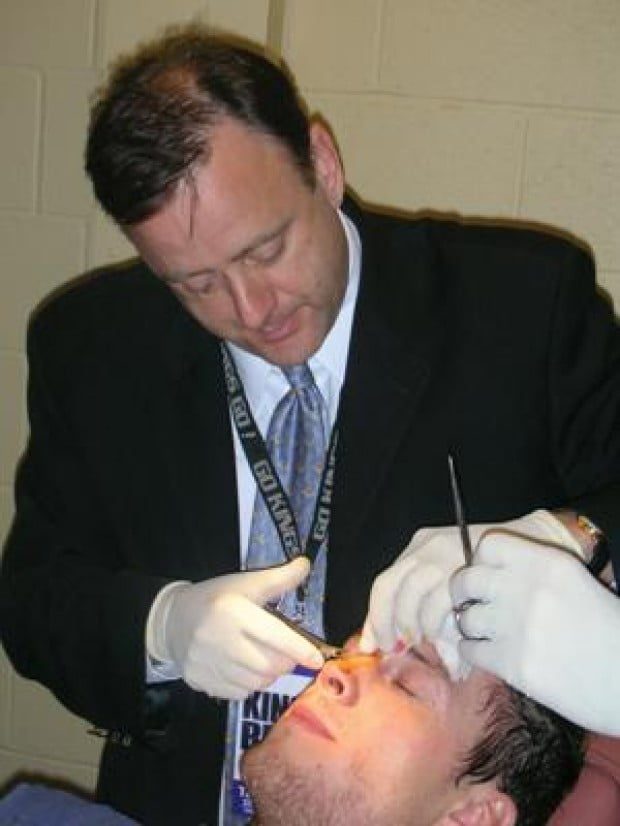
Dr. Chester Griffiths
By Seth Rubinroit / Special to The Malibu Times
Hockey is a dangerous sport. Six-ounce pucks made of hard rubber soar through the air at speeds as great as 100 mph. Players can be inadvertently struck by an errant hockey stick or gored by sharp hockey skates. Fights are common. It is, therefore, critical for hockey teams to have skilled doctors.
Since 2002, Malibu resident Dr. Chester Griffiths has been the maxillofacial plastic surgeon for the Los Angeles Kings. In addition to his work with the Kings, Griffiths volunteers at the Venice Family Clinic, is an assistant clinical professor at the UCLA Geffen School of Medicine, and has a private practice in Brentwood.
How did you get the job with the Kings?
Both the trainer and the team physician, Ronald Kvitne, thought it would be a good idea to have a specialist trained in common facial injuries for the players at each home game.
Take the reader through a typical game.
We arrive before the game begins and prepare the medical room, which is next to the team’s locker room. We check in with the training staff and answer their questions. We watch the game in preassigned seats close to the players’ bench so we are able to respond quickly to any medical issue. The trainer has standardized hand signals to alert the medical staff of a problem, and we proceed to the medical room where the player has been taken. If there is an on-ice medical incident, a prepared protocol by the National Hockey League is followed with a chain of command and first responders. We have all the equipment necessary to handle an advanced emergency, from a defibrillator for a cardiac arrest to a tracheotomy kit to secure an airway.
How do you quickly assess the severity of an injury with such critical deadlines during a game?
The protocol is based on common sense and safety, as directed by the head athletic trainer Chris Kingsley. If the injury is minor and can safely wait until the period break, we evaluate the player then. Other times, the player is evaluated immediately in the medical room.
What is the most gruesome injury you have seen?
Facial injuries can be quite shocking. The most complex laceration was a partial lip-nose avulsion (separation), which was repaired and healed up nicely.
When operating on hockey players, are they as tough as they seem on the ice?
Absolutely. The players are a pleasure to work with. They are respectful, courteous and tough. At times, they will request that no local anesthesia be administered to prevent swelling so they can immediately return to playing without impairing their vision if the laceration is around the eye. Their passion to play and compete is remarkable, even when they have sustained a facial injury.
How do you balance the health of a player and the desire of the team to get the player back on the ice?
A complex, standardized process keeps the players’ safety the primary priority and focus. The players’ return is determined by the team physician and trainer. The NHL has an extensive database of information regarding the health, preseason physicals and any injury that the players experience. The general manager is informed of every decision, and follows the recommendations of the physicians and trainers.
Considering the injuries you have seen, is it difficult to let your nine-year-old son play hockey?
No. Hockey is no more dangerous than other sports. Due to the amazing conditioning and skills of the players, and the protective equipment, it is not as dangerous as its reputation.
What are the perks of working for the Kings?
I am a fan of the game, the players and the Kings. The high-quality athletic trainers, medical staff and talented athletes, as well as the professionalism and high standards of the Kings organization make it a pleasure.
What advice do you have for people who aspire to work in the medical field with a professional sports team?
Go for it. It blends two passions, the passion to help and heal people, and the passion for professional sports. What more would one desire?
What do the Kings need to do to turn around their fortunes on the ice?
They are doing it. They are going to go far this season with the talent of the players and the vision of General Manager Dean Lombardi. It is going to be a fun season.
